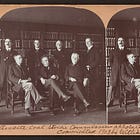
Do national leaders have a duty to enhance the welfare of citizens?
Marcus Tullius Cicero (106–43 BC) was a Roman statesman, orator, lawyer, and philosopher widely regarded as one of the Roman Republic’s greatest orators and writers.
During the late Roman Republic, extreme wealth disparity tore the social fabric of Rome. Conquests brought immense wealth, but only to a few elite families. This wealth disparity led to struggles between the plebeians (the people) and patricians (the aristocrats) over land, political equality, and access to resources.
For much of the republic, soldiers were typically small landowners. As wealth concentrated in the hands of the few, aristocrats increasingly bought up this resource. Soldiers became landless men. Commanders promised the soldiers care and stability, and soldiers became more loyal to their commanders than to the republic.
Powerful and ambitious leaders like Pompey, Julius Caesar, and Crassus rose. These men formed an unofficial political alliance that historians call the First Triumvirate to challenge the republic’s governance structures. Their rivalries and personal armies led to a series of civil wars.
Political corruption ensued. Politicians bought offices and votes, eroding the principles of Roman governance and public trust. Influential individuals exploited the largely unwritten and tradition-based Roman Constitution, pushing its boundaries to achieve their ends and ultimately breaking constitutional norms.
The assassination of Julius Caesar in 44 BC led to more civil wars. Octavian (later Augustus) prevailed in these conflicts and became the first emperor of Rome in 27 BC, marking the end of the Roman Republic and the beginning of the Roman Empire.
In this turbulent context, Cicero championed the potential of philosophy to improve governance and society. He believed in applying philosophical concepts pragmatically to address Rome’s challenges. His work, De Re Publica (On the Republic, written around 54-51 BC), explored the nature of Roman government and proposed an ideal state structured around a balanced mix of monarchy, aristocracy, and democracy. This mixed system, he argued, would prevent tyranny by dividing power among the people, the senate, and a monarch, ensuring no single group could dominate.
Cicero discussed the importance of setting a moral example and leading by that example to foster unity and ethical behavior among citizens. He posited public leadership as a service to the nation and not a means to accumulate personal gain, power, or wealth. Leaders are the guardians of the state’s traditions and must strive to enhance the welfare of its citizens.
Cicero's republican philosophy balanced moral integrity, the rule of law, and the distribution of power. His philosophy later significantly influenced John Locke and Enlightenment Liberal thought and, therefore, the US Constitution.
It’s been almost 2100 years since Cicero penned his theses, but much of his philosophy is still relevant today. Sufficiently dividing power between groups weakens each group, preventing them from robbing individuals of their liberty. National service is a privilege and not a means to achieve personal gain. National leaders must strive to enhance the welfare of citizens, not to strengthen their own political party.
Recently, Project 2025 has sparked debate over its vision for America’s future. Their work, Mandate for Leadership 2025: The Conservative Promise, claims to advance “positive change for America” towards “the drive to make our country better.”
The Heritage Foundation, a conservative Washington, D.C. think tank, is leading the effort. We shouldn’t be against think tanks positing ideas. American leaders need to care about America, not party; good ideas come from many sources. The balance between liberal and conservative thought is a cornerstone that makes America great.
America needs strong liberal leaders to advance progress toward the opportunity for all Americans to be born from nothing and achieve greatness. After all, one of the foundational beliefs in America is that we are all created equal and have the inherent right to life, liberty, and the pursuit of happiness. Throughout our history, we have fallen short of this stated goal, and we need liberal leaders to advance our progress toward it.
America needs strong conservative leaders to conserve the institution that is the structure of our constitutional democratic republic. Conservatives advocate for limited government and divided power, a philosophy outlined by Cicero and Locke. They argue that individuals should take responsibility for their own lives, successes, and failures rather than rely on government assistance or intervention. This principle is consistent with Cicero’s and Locke’s views of moral integrity and the natural right of individuals to own themselves and the product of their labor. We need strong conservative leaders to preserve the institution that is the American Republic.
So, I have no heartburn with the Heritage Foundation or other think tanks proposing ideas, many of which are outlined in Project 2025.
My problem with Project 2025 is that it’s poorly done. As a conservative playbook, it falls short. It needs to reorient towards the decisive effort of American conservatism and focus on preserving the American institution.
Here’s an example…
Page 4 of the report outlines Project 2025's Promise #1: Restore the family as the centerpiece of American life and protect our children. The first sentence of the section is…
The next conservative President must get to work pursuing the true priority of politics—the well-being of the American family.
This is an admirable goal. It echoes back to Cicero’s position that leaders must strive to enhance the welfare of citizens.
Unfortunately, the reader can’t make it past that same page without reading about fatherlessness and the terms “woke progressivism” and “woke culture warriors.”
This continued effort to participate in a perceived culture war is unproductive. The premise of individual liberty is that if you have the right to individual liberty, so does everyone else, even if they express it in a manner objectionable to you. Leaders need to stop focusing on culture wars and focus on governance.
Further, focusing on culture wars detracts from the goal of improving the well-being of the American family. And we severely need to enhance the well-being of the American family.
What’s the one thing that, more than anything else, promotes families to have economic and, therefore, community and emotional stability? Is it whether a woman can make decisions about her property? Which books are available for a child in a school library? The tax status of my local church? Which bathroom a teenager can use? No. None of these.
More than any other factor, families need to be able to heat their houses and put food on the table. To have rooms to heat and tables to put food on, families need the opportunity to buy a home.
One of our nation’s best presidents, Theodore Roosevelt, was a conservative who championed a square deal for the American people. And we need a conservative approach to our housing market challenge.
We aren’t going to achieve stability through homeownership for families with government programs. Government programs build government housing, and individuals don’t get to own government housing.
Instead, we need leaders to work through the market to make homeownership attainable for families. We need to enable first-time homebuyers the opportunity to buy homes at a low interest rate so they can have stability in any financial environment. Families need to be able to purchase these homes with the earnings from one full-time job to have the stability of a parent at home.
This is just one example of a conservative approach to pursuing the true priority of national leadership—the well-being of the American family. This most decisive family support element needed the center-stage spotlight in Project 2025.
From the Cicerean philosophy of the ancient Roman Republic to John Locke's ideas that underpin the US Constitution to the legacy of the great conservative President Teddy Roosevelt, it is evident that national leaders have a duty to enhance the welfare of their citizens.
We need to stop focusing on culture wars and focus on governance.
Homeownership is the decisive governance element that would improve the stability of American families.
May God bless the United States of America.
Postscript.
I strongly condemn the assassination attempt on President Trump. We have radical disagreements across America, but political violence is reprehensible.
I invite you to read Financial Security for Young Americans for more about homeownership for young Americans and a pitch to support first-time homebuyers.
I invite you to read or listen to Small, Affordable Homes to consider how we might work through the market to expand the availability of homes for first-time homebuyers.
I invite you to read or listen to Has Capitalism Failed the Housing Market to consider a national leader’s duty to work through the market.
I invite you to read or listen to Progressives for more details about the great conservative President Teddy Roosevelt.


















Share this post